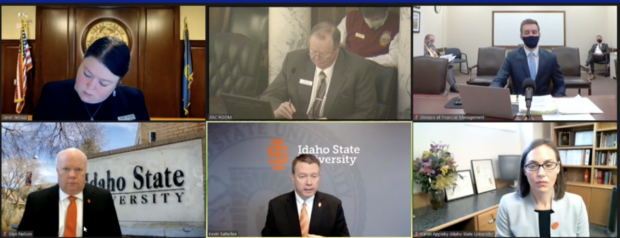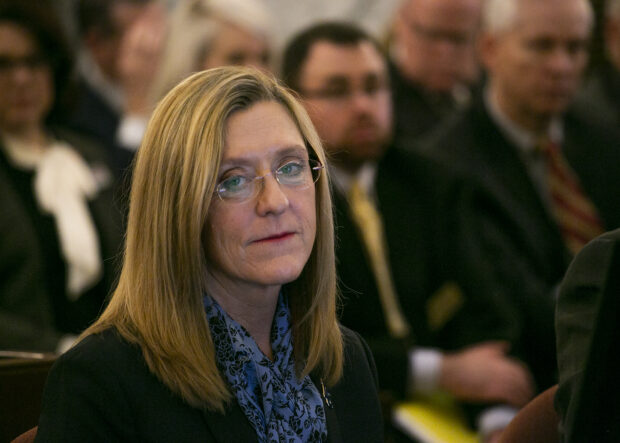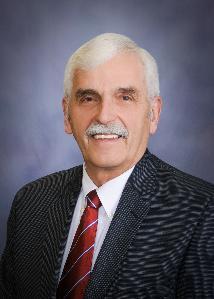
Idaho State University and Lewis-Clark State College have cut jobs to balance their budgets and weather the pandemic.
But on Tuesday, Lewis-Clark President Cynthia Pemberton said that can’t continue indefinitely.
“We’re a people business,” Pemberton told the Joint Finance-Appropriations Committee. “And we need to begin reinvesting in our people.”
JFAC, the Legislature’s powerful budget-writing panel, continued a week of education budget presentations Tuesday morning. Lawmakers won’t begin writing budgets for several more weeks — and when they get to higher education, they will consider Gov. Brad Little’s recommendation to put $315.2 million of general fund tax dollars into the four-year college and university system. That represents a 2.6 percent increase from 2020-21.
Pemberton and Idaho State President Kevin Satterlee both inherited budget shortfalls when they were hired in 2018. The pandemic has only compounded their problems — costing the schools millions of dollars in operating revenue, and forcing the state to impose a 5 percent budget holdback across most state agencies.
By the end of 2021-22, Idaho State will permanently cut $12 million from its budget and eliminate 94 jobs, Satterlee told JFAC. The university also imposed a series of one-time budget cuts, including a hiring freeze and a $2 million furlough plan.
Meanwhile, Idaho State has all but drained its share of money from the federal Coronavirus Aid, Relief and Economic Security Act, passed in March. The university received about $7.1 million from the CARES Act, and now has only a leftover $14,295 in student aid to distribute this school year, Satterlee said.

Lewis-Clark’s $2 million in CARES Act money is down to roughly $200,000, Pemberton told JFAC. While CARES Act can help colleges cover coronavirus-related expenses — such as monthly student virus testing at Lewis-Clark — the colleges cannot use the money to replace lost revenues.
Little recommends taking $13.5 million from the state’s higher education savings account to help offset those revenue losses. Idaho State would receive $6.9 million and Lewis-Clark would receive $1.7 million.
Tuesday’s hearings were brief — and non-confrontational. Rep. Wendy Horman, R-Idaho Falls, praised Satterlee’s progress on fixing Idaho State’s finances. Rep. Caroline Nilsson Troy, R-Genesee, said Pemberton and her senior staff had already made some difficult staffing decisions.
“I applaud you for your efforts,” Troy said.
On Tuesday, Satterlee again tied a tuition freeze to Little’s budget request — saying Idaho State can make a second year of freezes work if lawmakers approve the governor’s budget. The University of Idaho and Boise State University have made similar pledges, but Pemberton has said Lewis-Clark will need a tuition hike, saying the college is “more lean than is sustainable.”
JFAC’s “Education Week” began Monday, with a budget pitch from U of I President C. Scott Green. Boise State President Marlene Tromp is scheduled to make her budget presentation Friday. Budget-writers also will hear presentations from the state’s community college presidents, and state superintendent Sherri Ybarra will present her K-12 budget request Thursday.
House Education advances charter funding bill
The House Education Committee advanced a bill Tuesday that is designed to lift a funding cap on charter schools that experience rapid enrollment growth.
Pushed by lobbyist Suzanne Budge and House Education Committee Chairman Lance Clow, House Bill 22 would remove a cap on charter school funding calculations they say would prevent Idaho Digital Learning Academy and Inspire Connections Academy from receiving full state funding for all of their new students.
Clow asked the committee to advance the bill after pointing out the cap only applies to charter schools. There would be no cap for traditional school districts that experience rapid enrollment growth. Clow also said this is the only time the cap has been exceeded since it was put in place via state law in 2005. Clow said the rapid student increase was due to families shifting their students to virtual charter schools amid the coronavirus outbreak.
Statewide, enrollment dropped, but charter schools added thousands of students.
Although the bill was fairly simple and put before a House Education Committee that is vocally in favor of school choice, the committee still gave it what Vice Chairman Ryan Kerby, R-New Plymouth, described as “an extremely nuanced hearing.”
One aspect of the bill that caused legislators to bristle was the cost of lifting the cap at $7.6 million.
“Why in the world are we here in this situation?” Rep. Gary Marshall, R-Idaho Falls, asked. “Why didn’t someone, last fall, say, ‘We’ve hit our cap. We can’t take anybody else you are going to have to go back to your regular school.’”
Kelly Edginton, head of school for Idaho Digital Virtual Academy, apologized to Marshall, saying she reads a lot of statutes but wasn’t familiar with the obscure cap.
“Families needed a place to go in the fall,” Edginton said “It would have been very difficult to turn people away when they were hurting and needing a place to go.”
Marshall ended up supporting the bill, which passed out of committee comfortably in the end.

“I’m grateful these schools where there to fill a need,” said Rep. Ron Mendive, R-Coeur d’Alene. “This was a unique situation. I think it would be a crime not to fund them.”
State officials estimated that if the cap is not lifted, IDVA would miss out on about $6 million in funding and Inspire Connections Academy would miss out on about $1 million.
During Tuesday’s hearing, the committee made use for the first time of the remote technology legislative leaders provided to allow more people to watch and participate remotely in this year’s legislative session as the coronavirus continues to spread.
Public Charter School Commission Chairman Alan Reed testified in support of the bill using Zoom from Idaho Falls.
Later Tuesday, the presidents of Idaho’s community colleges provided a remote presentation to the committee.
House Bill 22 heads next to the House floor for consideration.
Editor’s note: Idaho Education News covered Tuesday’s hearings remotely.
